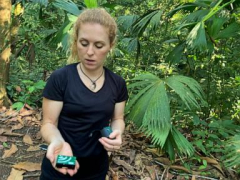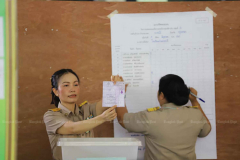PUERTO JIMÉNEZ, Costa Rica — The endangered Geoffrey’s spider monkeys that dangle high in the rainforest canopy are elusive and hard for scientists to track.
So biologist Jenna Lawson hid 350 audio monitors in trees across Costa Rica’s lush Osa Peninsula to spy on them.
The devices recorded the sounds of the forest and surrounding countryside for a week, collecting so much data that Lawson could have spent years listening to it all.
Instead, she fed it into artificial intelligence systems trained to instantly recognize spider monkey calls and detect where the animals traveled. One of the world’s largest acoustic wildlife studies when Lawson began the project in 2021, it revealed troubling findings about the health of a treasured wildlife refuge.
More of this AI-assisted wildlife surveillance is “urgently needed” as some 28% of all plant and animal species are now at risk of extinction, according to a paper published in the academic journal Science this summer. Researchers from Dutch and Danish universities showed that machine-learning techniques can “handle huge amounts of data and uncover sound patterns, allowing for faster, cheaper, and better ecological studies” that can aid in biodiversity conservation. But many technical challenges remain.
Tech giant Microsoft’s philanthropic AI for Good Lab announced this month it is hoping to answer some of those technical challenges with a new kind of hardware and computing system for eavesdropping on the planet’s wildest places.
“Those remote places are also the most important places on the Earth from a biodiversity perspective,” said Microsoft’s chief data scientist, Juan Lavista Ferres, in an interview last week by video call from Colombia, where a research team was preparing to test the new approach.
Powered by the sun and energy-efficient AI computer chips, the devices can run for years rather than weeks without human intervention. And they can regularly transmit their data online via low-Earth orbit satellites. It’s called Sparrow, short for Solar-Powered Acoustic and Remote Recording Observation Watch.
Pablo Arbelaez, director of an AI-focused research center at the University of the Andes, said a first Sparrow test will happen in a jungle preserve along Colombia’s largest river, the Magdalena. Eventually, the researchers hope to ge





